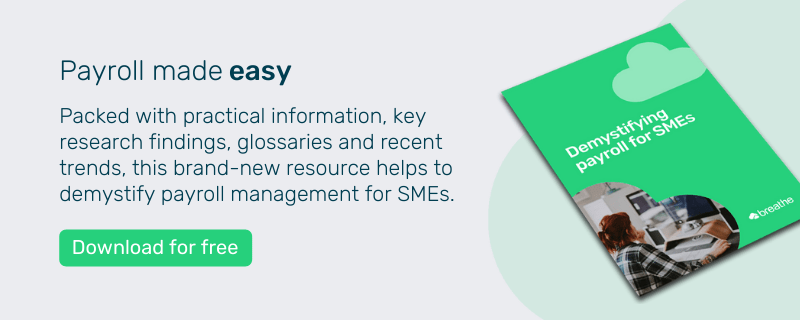Not all payroll deductions are created equally. Some must be paid, while others are voluntary. As an employer it is your job to ensure all mandatory deductions are made, and the voluntary ones are duly considered.
Payroll deductions explained
A payroll deduction is a payment made out of your employee’s basic salary earnings, on their behalf. When it comes to calculating your employee’s pay at the end of the month, whether this be for a standard full-time worker or a pro-rata employee, you will need to factor in these payroll deductions.
Before making any payday changes to your employees payslip, there are three conditions to be aware of. These conditions allow you to legally make a payroll deduction:
-
Statutory deductions required by British law
-
There is a deduction stated in the employees contract
-
The employee has consented to deductions
Breaking this down they fall into two categories: mandatory and voluntary deductions.
What can you do if you overpay your employee?
Wage overpayment is a not uncommon situation an employer can find themselves in. If you overpay an employee on payday, you’re legally allowed to take the money back without it falling into the three conditions.
However, it's best to communicate this with your employee. Discuss the deduction with them rather than it being a surprise on their next paycheque. From here you can work out how much will be taken from any future pay.
If you work in retail, be aware that there are rules that stop you from deducting more than 10% from the gross amount of any wage.
What are mandatory payroll deductions?
Mandatory or statutory payroll deductions are the withdrawal of a specified amount of pay by law. Among other things, these deductions include tax, National Insurance and child maintenance.
Tax
Employers will have to ensure that income tax is deducted from their employees' pay.
Income tax is a tax taken directly from personal income. If your employees' earnings go above what the UK government outlines as a personal allowance, they will start having to pay income tax on their earnings.
The standard personal allowance is £12,570, with any income over that amount being taxable. The amount of tax paid by your employees after that is dependent on how much they earn in a tax year.
This is split into different tax rates:
|
Personal Tax Allowance (England & NI) |
2024 to 2025 |
|
Tax-free personal allowance |
£12,570 |
|
Basic tax rate (20%) |
Earnings up to £50,270 |
|
Higher tax rate (40%) |
Earnings between £50,271 - £125,140 |
|
Additional tax rate (45%) |
Earnings over £125,140 |
For more information on Scotland and Wales visit: GOV.UK
National Insurance
National Insurance is a type of tax that helps to pay for some state benefits, this includes state pension, statutory sick pay and maternity leave.
National insurance is paid by employers, as well as employees and self employed workers.
As an employer you need to be aware of incorporating Class 1 National Insurance contributions. This will be what your employees will pay from their paycheque.
|
Employee's pay |
Class 1 National Insurance Rate |
|
£242.01 to £967 a week (£1,048.01 to £4,189 a month) |
10%* (*dropping to 8% from April 2024) |
|
Over £967 a week (£4,189 a month) |
2% |
Source: GOV.UK
Student loan
The present higher education system in the UK provides students, both full-time and part-time, with government funded loans to help pay their course and living expenses while studying.
The loan is facilitated by the Student Loan Company (SLC), while HMRC collects the repayments. Loan rules differ across the UK and from the date the loan was granted. When it comes to payday you will split these into three different groups: Plan 1, Plan 2, and Plan 4.
Students won’t start repaying their loans until they have left their course and their gross income (income before tax and NI) is above the plan threshold.
Plan 1
On Plan 1, the annual income threshold for starting to make plan repayments is £22,015. This is for students who are English or Welsh and who started their undergraduate course before 1 September 2012.
Plan 1 includes Northern Irish students who started an undergraduate or postgraduate course on or after 1 September 1998. EU students who started a course in England or Wales on or after 1 September 1998, but before 1 September 2012 are also on Plan 1.
Plan 2
The annual income threshold for Plan 2 students currently sits at £27,295.
Your employee will be on Plan 2 if they are an English or Welsh student who started their undergraduate course anywhere in the UK on or after 1 September 2012.
EU students are on Plan 2 if they started an undergraduate course in England or Wales on or after 1 September 2012.
Plan 4
The annual income threshold to start repayments for Plan 4 is £25,000.
Your employee will be on Plan 4 if they are a Scottish student who started their undergraduate or postgraduate course anywhere in the UK on or after 1 September 1998. EU students who started an undergraduate or postgraduate in Scotland on or after 1 September 1998 are also on Plan 4.
Once an employee’s income goes above these thresholds, a 9% deduction will be made out of whatever income comes above the plan limit.
Postgraduate loans
The threshold for repayments for postgraduate loans sits at £21,000.
Your employee will be on a PGL if they are an English or Welsh student who took out a PGL loan on or after August 2016.
Court orders
In some cases a court can order deductions to be made from your employees’ pay after tax This can happen for a number of reasons, with the most common usually being due to them having a debt, fines or being in arrears with a council tax bill. These are known as Attachment of Earnings Orders (AEOs) or Earnings Arrestment.
The deductions you will have to make may be a specific lump sum, or be based on percentage of the employees’ net pay.
Child maintenance
Along the same lines as a court order, if your employee is a separated parent, the Child Maintenance Service or Child Support Agency (CSA) can ask for a Deduction Earnings Order (DEOs) for the upbringing of the child.
Child maintenance is not only collected through DEOs, and can sometimes be collected through AEOs. Regardless of which one is being used both DEOs and AEOs are mandatory deductions and must be paid. For more information on DEO’s and AEO’s, GOV.UK. has a relatively straightforward explainer.
What are voluntary deductions?
For all voluntary deductions, employers will need to get the express permission of their employees.
Health insurance premiums
Some employers will offer a form of health insurance as part of an employment benefit package. However, this is not always a viable option. Instead employees can make a voluntary contribution as part of their monthly pay.
These deductions will vary depending on the plan chosen by the employee. This can cover doctors visits, prescriptions, scans, and longer hospital stays.
Retirement plans
Another common voluntary deduction for employers to take into account is enrolling employees on a scheme to pay towards a retirement plan or pension.
An employer must pay towards a workplace pension by law, however you may include an optional voluntary contribution by the employee, which comes as a deduction from their monthly salary.
This is something the employee must opt in to and does not affect the amount you as an employer must pay by law.
Life insurance premiums
You may wish to provide your employees with the option to pay into a life insurance premium as a deduction from their monthly salary.
In the sad event of an employee passing away, the life insurance will provide their family or noted beneficiaries with a payment.
Having it deducted from a monthly salary may make it more affordable or easier to budget around for employees who might not have chosen it otherwise.
Make payroll work for you
Make payroll one less thing to worry about at the end of the month. Save time on payroll admin by downloading entire reports, with all employee changes included. With Breathe’s HR & payroll management software, all the data you need is right at your fingertips.
Author: Andy Stewart
.webp)



